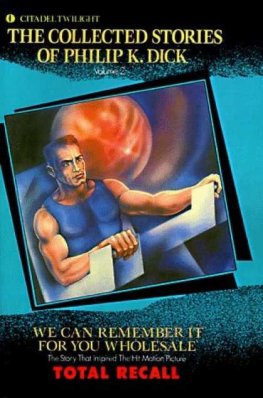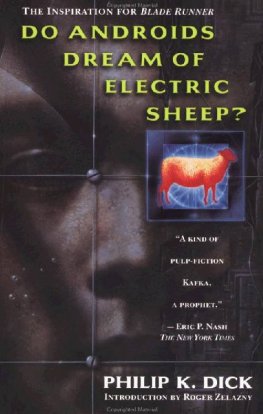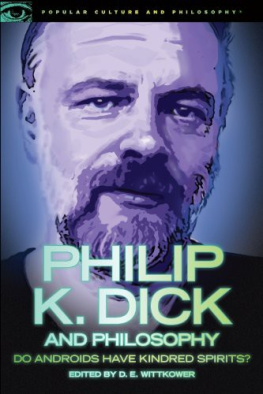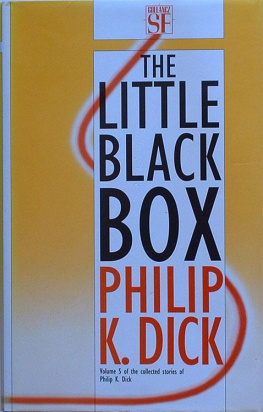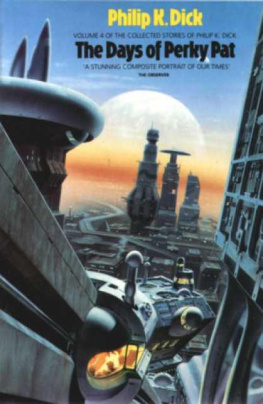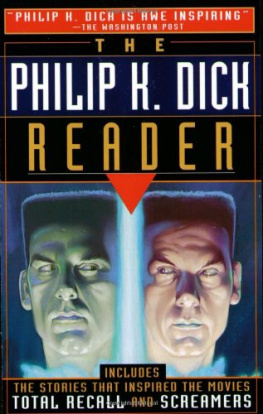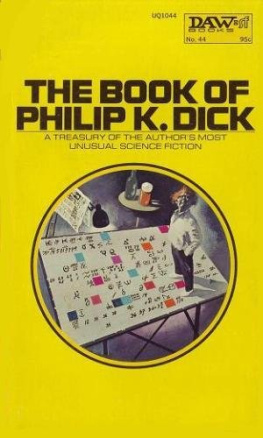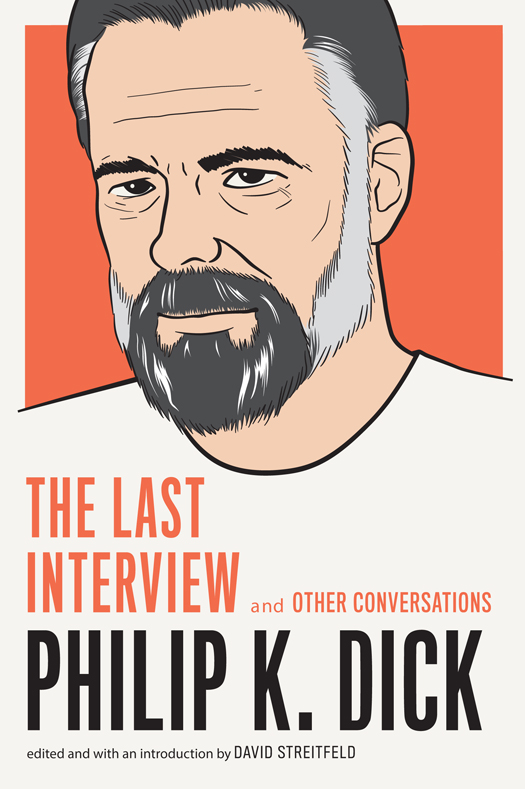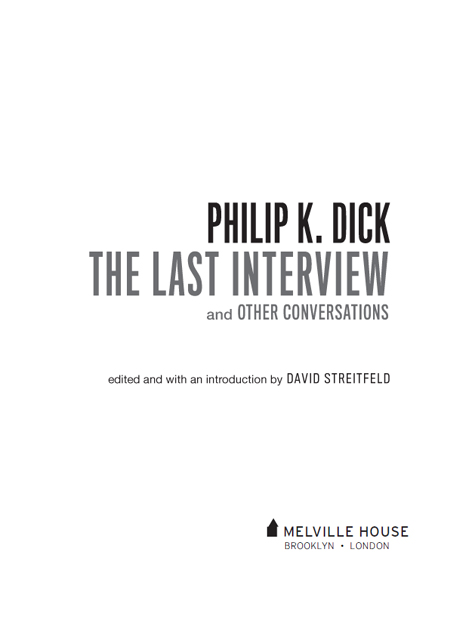PHILIP K. DICK: THE LAST INTERVIEW
AND OTHER CONVERSATIONS
Copyright 2015 by Melville House Publishing
Local Kid Makes Good 1955 by the Oakland Tribune, First published in the Oakland Tribune on January 10, 1955.
The Acid Truth 1974 by Arthur Byron Cover. First published in the February 1974 issue of Vertex.
Even Paranoids Have Enemies by Cindy Lee Berryhill. First published in Only Apparently Real by Paul Williams (Arbor House, 1986).
Anticipating the Future 1987 by D. Scott Apel. First published in Philip K. Dick: The Dream Connection (The Permanent Press, 1987).
Killing the Rat 1980 and 2015 by Charles Platt. First published in a different form in Dream Makers: The Uncommon People Who Write Science Fiction (Berkley Books, 1980).
Blade Runner and Hollywood Temptations by James Van Hise. Expanded from an interview in Star Log magazine in February 1982.
Destruction and Enlightenment: The Last Interview by Gregg Rickman. First published in slightly different form in Philip K. Dick: The Last Testament (Fragments West / The Valentine Press, 1985).
Melville House Publishing
46 John Street
Brooklyn, NY 11201
and
8 Blackstock Mews
Islington
London N4 2BT
mhpbooks.com facebook.com/mhpbooks @melvillehouse
Library of Congress Cataloging-in-Publication Data
Dick, Philip K. | Streitfeld, David.
Philip K. Dick : the last interview and other conversations / edited and with an introduction by David Streitfeld.
Brooklyn, NY : Melville House, [2015]
The last interview series
LCCN 2015039266
ISBN 9781612195261 (paperback)
ISBN 9781612195278 (ebook)
LCSH: Dick, Philip K.Interviews. | Authors, American20th centuryInterviews.
Science fictionAuthorship.
BIOGRAPHY & AUTOBIOGRAPHY / Literary.
LITERARY COLLECTIONS / American / General.
LCC PS3554.I3 Z46 2015
DDC 813/.54dc23
LC record available at http://lccn.loc.gov/2015039266
eBook ISBN: 978-1-61219-527-8
v3.1
CONTENTS
Oakland Tribune
January 10, 1955
Interview by Arthur Byron Cover
Vertex
February 1974
Interview by Paul Williams
October 31 and November 2, 1974
Interview by D. Scott Apel and Kevin C. Briggs
June 20, 1977
Interview by Charles Platt
May 17, 1979
Interview by James Van Hise
August 1981
Interview by Gregg Rickman
April 1981February 1982
INTRODUCTION
DAVID STREITFELD
Philip K. Dick was often lonely and filled with longingfor a supreme being whose presence he felt emotionally and viscerally but could not intellectually accept; for his twin sister, Jane, dead a few weeks after their birth; for readers who could share his search for a reality he could trust. One reason he was so prolificforty-five novels in thirty years, plus five fat volumes of short storieswas because his characters offered companionship he could find nowhere else.
In our hyperconnected world, where encouragement and enthusiasm are never more than a tweet away, its easy to forget just how isolated most novelists used to be, how dependent on their own energies and moods. There were so many barriers between them and an audience that the more insecure writers wondered if they had readers at all. Stumbling across a perceptive review was an occasion for celebration: someone understands, someone cares.
Working in the ghetto of science fiction, Dick was at a double remove. His publishers treated him like a hack, at one point destroying nearly all the copies of a new novel before it was even distributed, thanks to some bureaucratic screwup; the science fiction world took him for granted and the literary world did not know he existed; his wives (he had five) and girlfriends tended to be younger, doting, and not his intellectual equal; and he was too shy when he was young to meet and mix with other writers. In his last years, he lived in Orange County, a conservative bastion and intellectual desert, and tried not to leave his apartment.
He found fans and friends wherever he could, including group therapy sessions at the Orange County Medical Center. If you were a pretty young woman, he would flirt with you incessantly. If you sent him your phone number and told him you liked his work, he would call you upand pay the charges, too. He met at least one serious girlfriend this way. It didnt last, but that was true of all his relationships.
If Dick craved attention and respect, it was only during the downtime. One thing I am sure of: to write a s-f novel you must make a total break with the world around you (such as wife and child, the garden which needs watering, the phone bill), he wrote a friend. But this is probably true of all novel writing. In any case, when Im doing a novel I live in its world, not my ownmy objective ownand I have great difficulty making the transition back to the objective one.
So: neglected and neglectful, full of energy but going nowhere. He added his own qualifiers: I am flighty, feckless, droll, a bit of a wit, melancholy & even suicidal, he wrote, noting that his life was an open book that he himself had written. His last attempt to kill himself, in 1976, was remarkable for its sheer determination: he took an overdose of all sorts of pills, slashed a wrist, and sat in his Fiat in the garage with the motor running, but lived to be locked up in the psych ward. In his 1981 novel Valis, in which he recounts the episode, Dick comments: The mercies of God are infinite.
It was a wonder he lasted as long as he did and wrote as much and as well as he did. His first professional sale was in 1951; a tale of garbagemen seen from the perspective of the family dog, it is now a small classic. Death arrived in 1982, just as he was on the verge of substantial fame with the release of Ridley Scotts film Blade Runner, which was based on his 1968 novel Do Androids Dream of Electric Sheep? and expected to be the biggest thing since Star Wars. It wasnt, but proved an enduring, influential work of art, which in the long run was even better for Dicks reputation. The ample press kit for Blade Runner barely deigned to acknowledge the writer, but Hollywood came calling again and again, yielding, most notably, Steven Spielbergs Minority Report and Richard Linklaters A Scanner Darkly.
All of that served only to benefit Dicks heirs. During his lifetime, he wrote because he needed the companionship, but he wrote fast because he needed the money. And since it was never enough money, he had to stay on the treadmill. It was the careeralthough not the booksof a hack.
I used to just get up at noon and sit down at the typewriter and write until two a.m., he said in a radio interview with Mike Hodel in 1977. Just write from noon in the morning until two a.m. Youve got to do that when you start out. Or youre going to die on the vine. I mean youve got to justyoure going to live on two thousand dollars a year. Youre going to eat rocks and dirt and weeds from the backyard for the first ten years. And then after the first ten years, you get to eat Instant Breakfast. You work up till youre rich enough to get a phone put in. And you get to buy an old automobile. And you get to drive around in an old automobile, which you crank-start every morning. And then after twenty-five years, you manage to get a used Dodge. It costs you $795, but the radio doesnt work in it. And theres people that are standing behind grocery counters are making more money. One time I was in Trader Joes, a grocery store, and I was talking with the clerk and he made more money than I did. And I was really sore. I really took it bad. Because they had just hired him. He didnt even have seniority as a grocery clerk. At least he could have been a senior clerk. I said, How much do you make? And he says, such and such. And I said, Jeepers, thats a lot of money.


